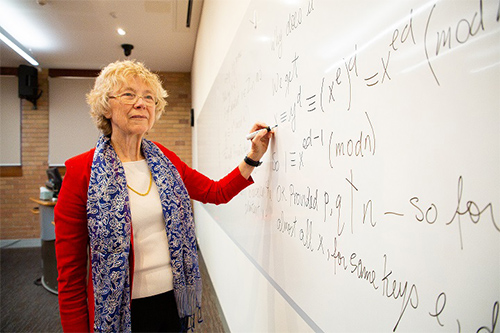
An internationally acclaimed mathematics professor whose work has contributed greatly towards the security of information online has taken out the 2019 Prime Minister's Prize for Science.
Emeritus Professor Cheryl Praeger from the University of Western Australia accepted the $250,000 prize at Parliament House on Wednesday night alongside six other award winners.
The Prizes are Australia’s most prestigious awards for outstanding achievements in scientific research and research-based innovation, including science, mathematics and technology teaching.
Emeritus Professor Praeger has one of the most stunning publication records of any mathematician, with more than 410 publications currently published.
Her highly innovative work includes research into the mathematics of symmetry in graphical models, which have far-reaching applications, such as enabling search engines to retrieve information efficiently from the World Wide Web.
Emeritus Professor Praeger is similarly famous for her research and work on algorithms – many of her algorithms are incorporated into powerful computer systems and have transformed the way in which algebra research and teaching is conducted.
“What I love about mathematics is the way that it explains the world,” Emeritus Professor Praeger said.
“It makes sense of the world. And as our technology advances and our world changes, the mathematical challenges are there, and they continue on and on.”
Industry, Science and Technology Minister, Karen Andrews, lauded the strong female representation in this year’s honours.
“[The 2019 Prime Minister's Prize for Science] have gone from having just one female recipient last year to five this year – the most ever represented in the awards,” Minister Andrews said.
“I hope this will inspire even more girls and women to be involved in [science, technology, engineering and maths].”
Emeritus Professor Praeger acknowledged the importance of this, saying she had seen a “huge change” in women's participation in STEM over the course of her career.
“I was only the second woman to be appointed a professor of mathematics at an Australian university and now, it's great to see so many women in leading positions in STEM and mathematics,” she said.
“It's important to make use of all of our talents and if we ignore half of the population, I don't think we're doing our best”.
‘It’s almost like having a superpower’
Emeritus Professor Praeger said Mathematics is a “fundamental” part of everyone’s lives.
“It's really important for young people to have a strong mathematics education. It helps them think logically and critically. It makes them confident problem solvers. It’s almost like having a superpower,” she said.
“In the future I’m most excited about the prospect of quantum computing. There will be so many new mathematical challenges to be faced and I look forward to being part of that journey”.
She said receiving the Prime Minister's Prize for Science was “a wonderful statement” about the importance of mathematics.
“It also recognises the achievements of me and my colleagues and students in the mathematics of symmetry,” she said.
Professor Robyn Owens from The University of Western Australia, said Emeritus Professor Praeger has created a “huge body of academic work and, most importantly, an equally large body of service in the generation of new mathematicians in Australia”.
“Throughout her extensive career, Emeritus Professor Praeger has had a remarkable influence in mentoring and developing mathematics in Australia,” Professor Owens said.
“She has supported women in mathematics and science, while advocating for mathematics in schools at all levels and promoting the discipline in emerging economies”.
Professor Peter Sarnak, Princeton University and the Institute for Advanced Study, USA, said Professor Praeger has made “fundamental and lasting contributions to the theory of finite groups and combinatorics”.
“Together with her leadership qualities, she is a very deserving winner,” Professor Sarnak said.
“It is important to recognise leading mathematicians such as Professor Praeger, who have stayed in Australia to build and maintain quality science, even though they had opportunities to take excellent positions elsewhere in the world”.
The 2019 recipients of the Prime Minister’s Prizes for Science are:
Prime Minister’s Prize for Science:
Emeritus Professor Cheryl Praeger AM, The University of Western Australia
Prime Minister’s Prize for Innovation:
Professor David Huang, Professor Andrew Roberts, Professor Guillaume Lessene and Associate Professor Peter Czabotar, Walter & Eliza Hall Institute of Medical Research
Frank Fenner Prize for Life Scientist of the Year:
Associate Professor Laura Mackay, The University of Melbourne
Malcolm McIntosh Prize for Physical Scientist of the Year:
Associate Professor Elizabeth New, The University of Sydney
Prize for New Innovators
Dr Luke Campbell, Nura Operations Pty Ltd, Victoria
Prime Minister’s Prize for Excellence in Science Teaching in Primary Schools:
Mrs Sarah Finney, Stirling East Primary School, South Australia
Prime Minister’s Prize for Excellence in Science Teaching in Secondary Schools:
Dr Samantha Moyle, Brighton Secondary School, South Australia


